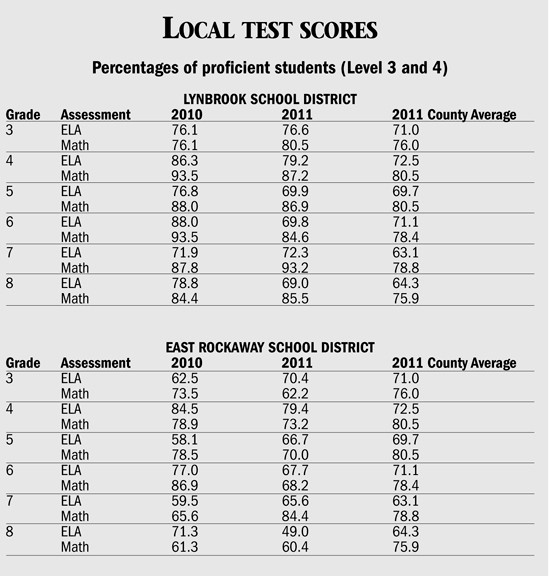Test scores disappoint Lynbrook, East Rockaway officials
The results of this year’s New York state English Language Arts and math assessments in grades 3 through 8 were upsetting, several Lynbrook and East Rockaway school administrators say.
“Overall, we are disappointed in our results,” said East Rockaway School District Superintendent Dr. Roseanne Melucci, “and will be looking at each score to see what interventions need to be applied to improve student performance.”
Compared with last year, the percentage of students who passed the exams — those scoring at levels 3 or 4 — dropped on several assessments. (Those who score at levels 1 and 2 are deemed in need of academic intervention.) In East Rockaway, passing rates in eight of the 12 assessments decreased this year, though students did surpass the county average on the fourth-grade ELA and both seventh-grade assessments. Lynbrook fared better, with students exceeding the county average on all tests except the sixth-grade ELA. The passing rate, however, dropped on seven of the 12 exams.
Across the state, the average scores in math were up over last year, while the English scores were slightly lower. A total of 52.8 percent of third- through eighth-graders met or exceeded the ELA proficiency standard, down from 53.2 percent last year. In math, 63.3 percent of students passed, up from 61 percent last year. However, the exams taken in May indicate an overall low academic performance by students, according to officials from the state Education Department.
This year’s exams were changed to be more comprehensive and a better measure of students’ skills. There were more multiple-choice questions on both assessments, and at least one full essay on each of the English exams.
In 2010, the “cut scores” — the minimum raw scores for levels 2, 3 and 4 — were increased in the interest of more thoroughly preparing students for college. Education Commissioner John B. King Jr. explained that the scores indicate a need for education reform. “Student outcomes have been stubbornly flat over time,” King said. “The Regents reform agenda is designed to change that, by driving long-term gains in student performance. Better tests are only one part of the reform strategy.”






